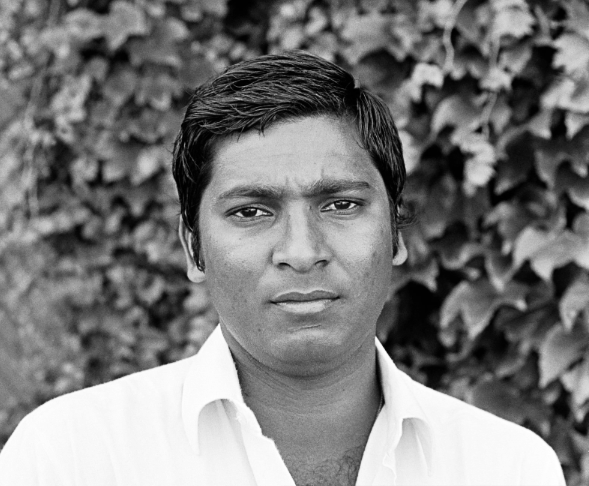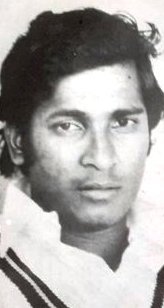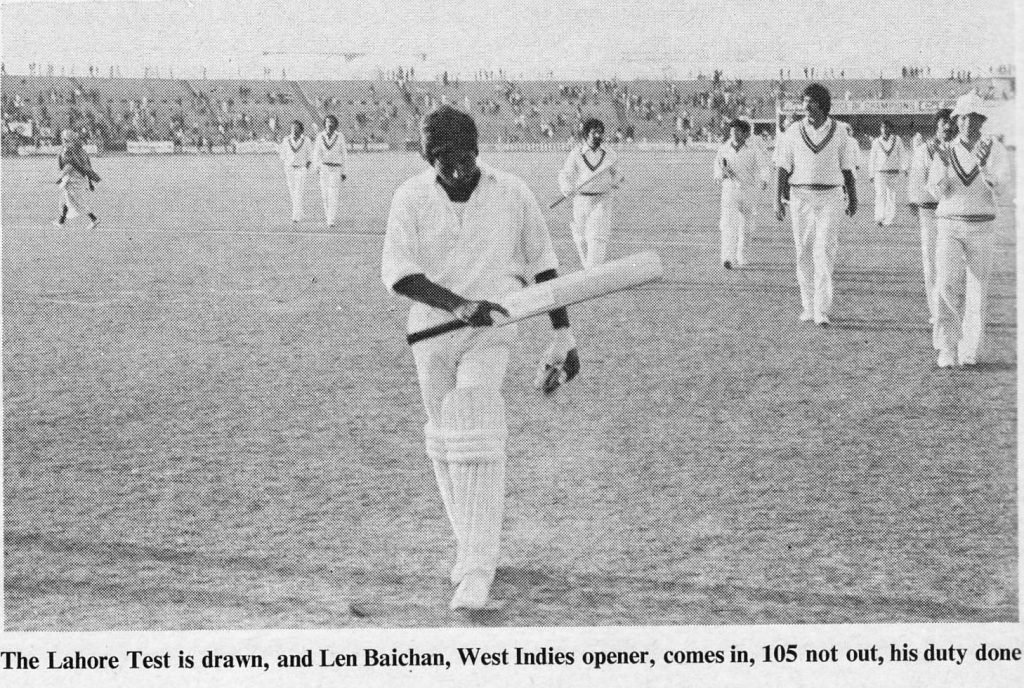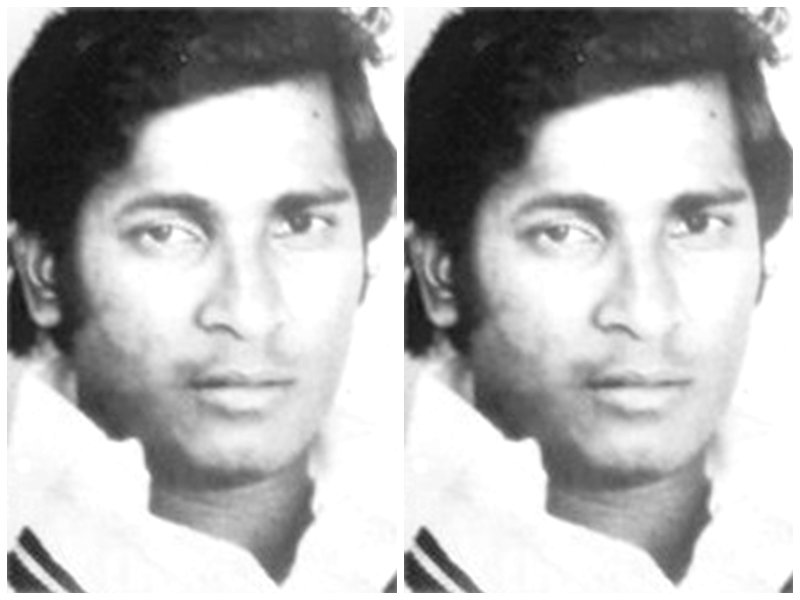During the opening weeks of the West Indies tour of Australia, the cricketing public saw more of a short, rather stocky left-handed opening batsman with an unfamiliar name and reputation than of all the Lloyds, Alvin Kallicharran, Roy Fredericks, Gordon Greenidge, and Viv Richards put together. While his better-known teammates struggled to play long innings, Leonard Baichan batted and batted and batted.

After his first five innings, he had chalked up very nearly 15 hours of occupation of the crease, and if Australian crowds were driven to exasperation watching him, Australian bowlers had the same feeling! Leonard Baichan’s style and attitude may be the antithesis of the typical West Indies image, but his steadying influence has often seen his team through embarrassing situations.
The fact that Baichan’s name comes very low on the list of characters in the star-studded touring group does not matter to him. He knows that he has been selected because of his approach, not in spite of it. On the side of extravagant stroke makers, he adds the necessary temperance and sobriety. “It’s no use me trying to imitate, say, Kallicharran, Lloyd, or Fredericks; Baichan says I don’t have their shots, their footwork, or their eyesight. I know I have limitations, and I know the only way to make runs and fulfill my role on the side is to play within them.
Leonard Baichan is born May 12, 1946, in Rose Hall Village on Guyana’s sugar coast. He grew up in the same cricket-conscious atmosphere that nurtured Rohan Kanhai, Basil Butcher, Joe Solomon, and, somewhat later, Alvin Kallicharran in the town of Port Mourant a mile or so down the road. His initiation into a first-grade club competition in Berbice County could hardly have been more traumatic.

The season was 1960–61, and in his first two matches, against Port Mourant (including Basil Butcher) and Blairmont (with Roy Fredericks), he failed to get a run. In his next game, he remembers getting a dogged 20-odd and saving the game for his team. “It was the time when Kline and Mackay saved the Adelaide Test against the West Indies, and I think that made me appreciate even more than ever that batting was not all brilliant strokes,” Baichan recalls.
It took some time for Baichan to gain recognition from Guyana’s selectors. He scored consistently in club matches and, just to prove he was able to adapt his method to suit the situation, won the Man of the Match award for the first inter-club limited-over competition in 1967. He was called to trials for the visit of the MCC in 1968, but it was not until 1969, when the bulk of Guyana’s batting was in Australia with the West Indies team, that he first played for the territorial team.
Leonard Baichan had good scores in his first season—64 against Barbados, 72 against Trinidad—but he realized that it was not enough to ensure him a permanent place in a side that had, at the top of its order, Fredericks, Camacho, Kanhai, and Lloyd, with another star, Kallicharran, just emerging. “People would keep telling me I would never make it, that I just wasn’t good enough, that there were too many batsmen in the Guyana team,” Baichan says. “But selectors can’t ignore runs, can they?” Or can they?
Leonard Baichan found himself in the stands watching while Guyana played in the Shield in 1970 and 1971. It so happened that all the stars were back. The bit players would have to wait. In the interim, he moved from the country to the city, Georgetown, where he was offered a job and a position in the team by the Everest Club When Everest beat Port Mourant in the final of the 40-over tournament in 1971, he was named Man of the Match, and with Rohan Kanhai and Lloyd absent (with the World team in Australia), he won back his place in the Shield team.
At last, he began to be accepted, not only for his ability to accumulate runs but for his importance to the Guyana team. With everybody else having an aggressive nature, Baichan has filed a vital position as a foil to people like Fredericks, Kallicharran, Kanhai, and myself in the Guyana team,” Clive Lloyd comments. This type of player is necessary for every side, and we have been happy to know that there’s someone like Baichan around to depend on”.
Leonard Baichan clinched his place in the West Indies team for the tour of India, Pakistan, and Sri Lanka for the 1974–75 tour by batting throughout the final day against the MCC to earn an improbable draw for the President’s XI. Keen to tighten his game and learn more, he applied to an advertisement in an English cricket magazine for a proposition at the Northern League club, Kendall, in 1973. He got the job, scored more than 800 runs, and came back satisfied.
On the last Indian tour, Baichan scored 711 runs, averaged over 50 innings, and marked his Test debut with a second-inning century against Pakistan, which lasted seven and a quarter hours and was, for the umpteenth time, a match-saving effort. Many felt he was lucky to be in the 17th for Australia. They claimed he would never be able to handle the short ball on bouncy pitches and that his limitations would be exposed.

He quickly silenced such talk, sticking to his basic philosophy. “I’m not worried when the crowd barracks or when someone is really hitting the bowling ball at the other end,” Baichan says. “I have a job to do, and that is to get runs. I can’t get them playing shots I don’t have”. On and off the field, Baichan lacks the usual ebullience of his teammates. He is quiet, rather unobtrusive, but always willing to talk cricket. And to pray like Kanhai, Kallicharran, Joe Solomon, and Sonny Ramadhin among others, Baichan’s ancestry is East Indian, and he is a Hindu.
He says he is not particularly religious but adds, “I pray a lot; it makes me feel at ease”. Perhaps in the coming months, Australian crowds and Australian bowlers will be doing a lot of praying too, so they won’t see quite as much of Baichan as they have already done.
The powerful, concentrated batsman just played three tests for his country, in which he scored 184 runs with the best of 105* on his test debut. He had a wonderful, healthy average of 51.18 in 63 first-class matches and scored 4,504 runs with the help of 13 tons, 23 half-centuries, and 35 catches. He scored 268 runs in 8 List-A matches, with the best of 74, including three fifties and two catches.
